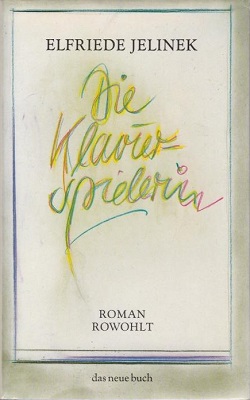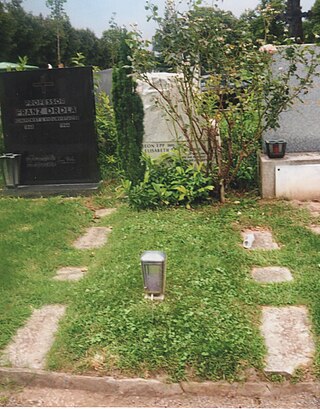
The University of Vienna is a public research university located in Vienna, Austria. Founded by Duke Rudolph IV in 1365, it is the oldest university in the modern German-speaking world and among the largest institutions of higher learning in Europe. The university is associated with 16 Nobel Prize winners and has been the home to many scholars of historical and academic importance.

Robert von Dassanowsky FRHistS, FRSA is an Austrian-American academic, writer, film and cultural historian, and producer. He is usually known as Robert Dassanowsky.

Elfriede Jelinek is an Austrian playwright and novelist. She is one of the most decorated authors to write in German and was awarded the 2004 Nobel Prize in Literature for her "musical flow of voices and counter-voices in novels and plays that, with extraordinary linguistic zeal, reveal the absurdity of society's clichés and their subjugating power". Along with Peter Handke and Botho Strauss, she is considered to be among the most important living playwrights of the German language.

Austrian culture has been influenced by its past and present neighbours: Germany, Hungary, Italy, Slovenia, and Bohemia.
Austrian literature is mostly written in German, and is closely connected with German literature.

The Piano Teacher is a novel by Austrian Nobel Prize winner Elfriede Jelinek, first published in 1983 by Rowohlt Verlag. Translated by Joachim Neugroschel, it was the first of Jelinek's novels to be translated into English.
Illness or Modern Women is a play by the Austrian playwright Elfriede Jelinek. It was published in 1984 in the avant-garde journal manuscripte of Graz and premiered on the stage of the Schauspielhaus Bonn on February 12, 1987, directed by Hans Hollmann. The play was published in book form by Prometh Verlag in 1987 with an afterword by Regine Friedrich. The title "parodically conflates women with illness." The play is based on an earlier, shorter radio play by Jelinek called Erziehung eines Vampirs, which appeared in 1986 on Süddeutscher Rundfunk.
Science fiction studies is the common name for the academic discipline that studies and researches the history, culture, and works of science fiction and, more broadly, speculative fiction.
Marlen Haushofer was an Austrian author, most famous for her novel The Wall (1963).
Dagmar C. G. Lorenz is Professor of German studies and from 2006 to 2010 served as Director of Jewish Studies at the University of Illinois at Chicago. She teaches and publishes on Austrian, German and German-Jewish literature and culture, and Holocaust Studies. She was born in Goslar, West Germany and began her studies at the University of Göttingen (Germany). She completed her Ph.D. in German (1973) and her MA in English (1974) at the University of Cincinnati. She taught at Rutgers University/Douglass College (1974/5), Ohio State University, Columbus, University of Illinois at Chicago, and held a Visiting Professorship at the University of Chicago (2000). She served as the editor of The German Quarterly (1997-2003) and held offices with MLA, GSA, MALCA, and AATG.

Elfriede Gerstl was an Austrian author and Holocaust-survivor. Gerstl, who was Jewish, was born in Vienna, where her father worked as a dentist.
Das Werk is a play by the Nobel Prize winning Austrian playwright and novelist Elfriede Jelinek.
Italian Studies is an interdisciplinary field dealing with the study of the Italian language, literature, art, history, politics, culture and society.

The Children of the Dead is a novel by Elfriede Jelinek, first published in 1995 by Rowohlt Verlag. It is commonly regarded as her magnum opus. The novel won the Literaturpreis der Stadt Bremen in 1996. The prologue and epilogue were translated into English by Louise E. Stoehr in 1998, while a full English translation by Gitta Honegger is forthcoming.

The American Studies Association (ASA) is a scholarly organization founded in 1951. It is the oldest scholarly organization devoted to the interdisciplinary study of U.S. culture and history. The ASA works to promote meaningful dialogue about the United States of America, throughout the U.S. and across the globe. Its purpose is to support scholars and scholarship committed to original research, innovative and effective teaching, critical thinking, and public discussion and debate.

Leon Epp was an Austrian music director, theatre director and actor.

Die Schutzbefohlenen, is a play by Elfriede Jelinek written in 2013. She termed it a Sprachkunstwerk, a language artwork. It deals critically with the politics at the time concerning refugees. The play was first read in Hamburg on 21 September 2013. The first scenic production was in Mannheim on 23 May 2014. The first production in Austria was staged at the Burgtheater in Vienna on 28 March 2015, which was recognised internationally. Later that year, Jelinek expanded the text to reflect the changed political situation.
Luigi Reitani was an Italian literary scholar, translator and Germanist.
Fatima Naqvi is a literary and film scholar whose research focuses on modern Austrian film, ecological films, affect studies and the interconnections of film, literature and architecture. She is currently the Elias W. Leavenworth Professor of Germanic Languages and Literatures and Film and Media Studies at Yale University. Her works include How We Learn where We Live: Thomas Bernhard, Architecture, and Bildung and The Literary and Cultural Rhetoric of Victimhood: Western Europe, 1970-2005.










